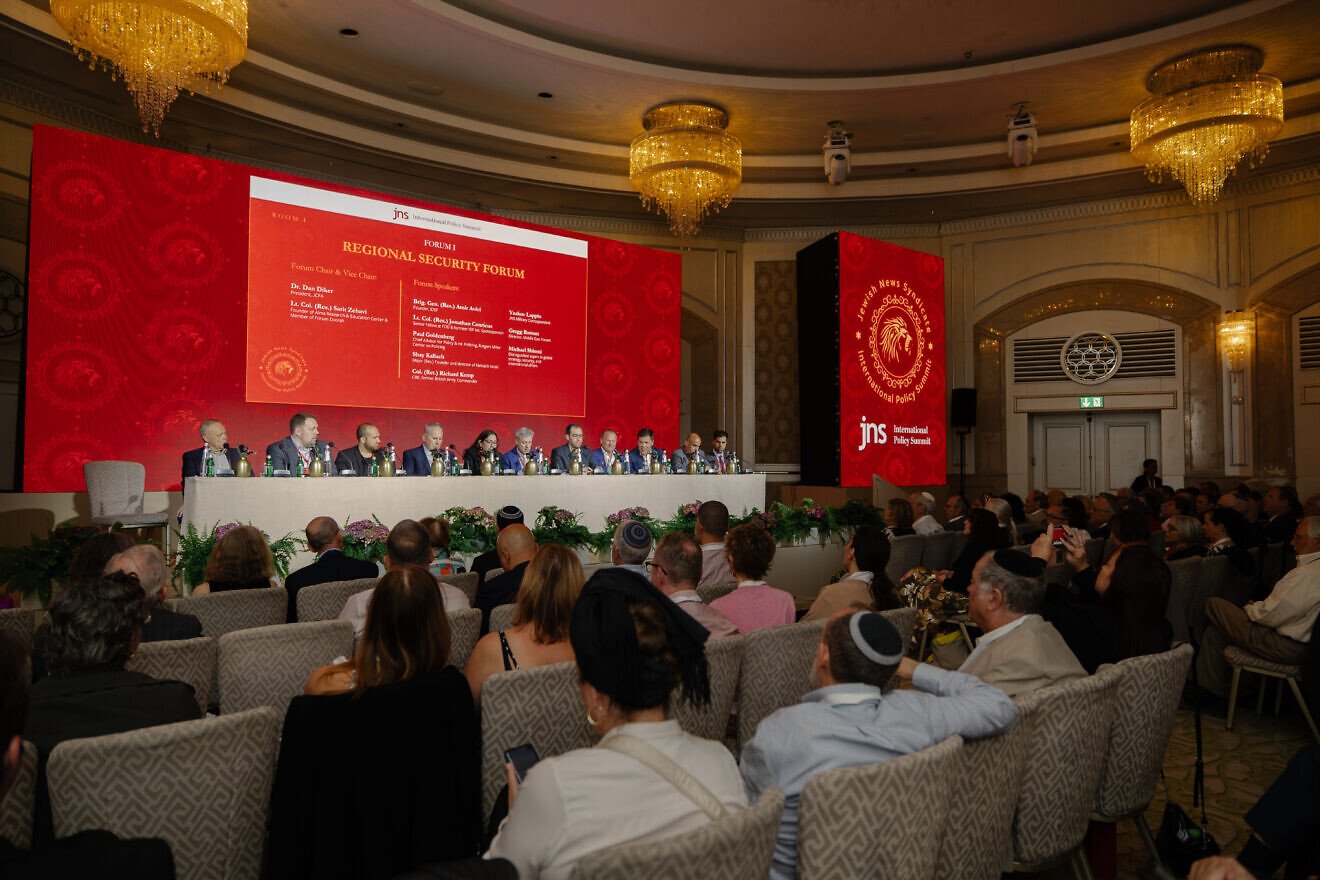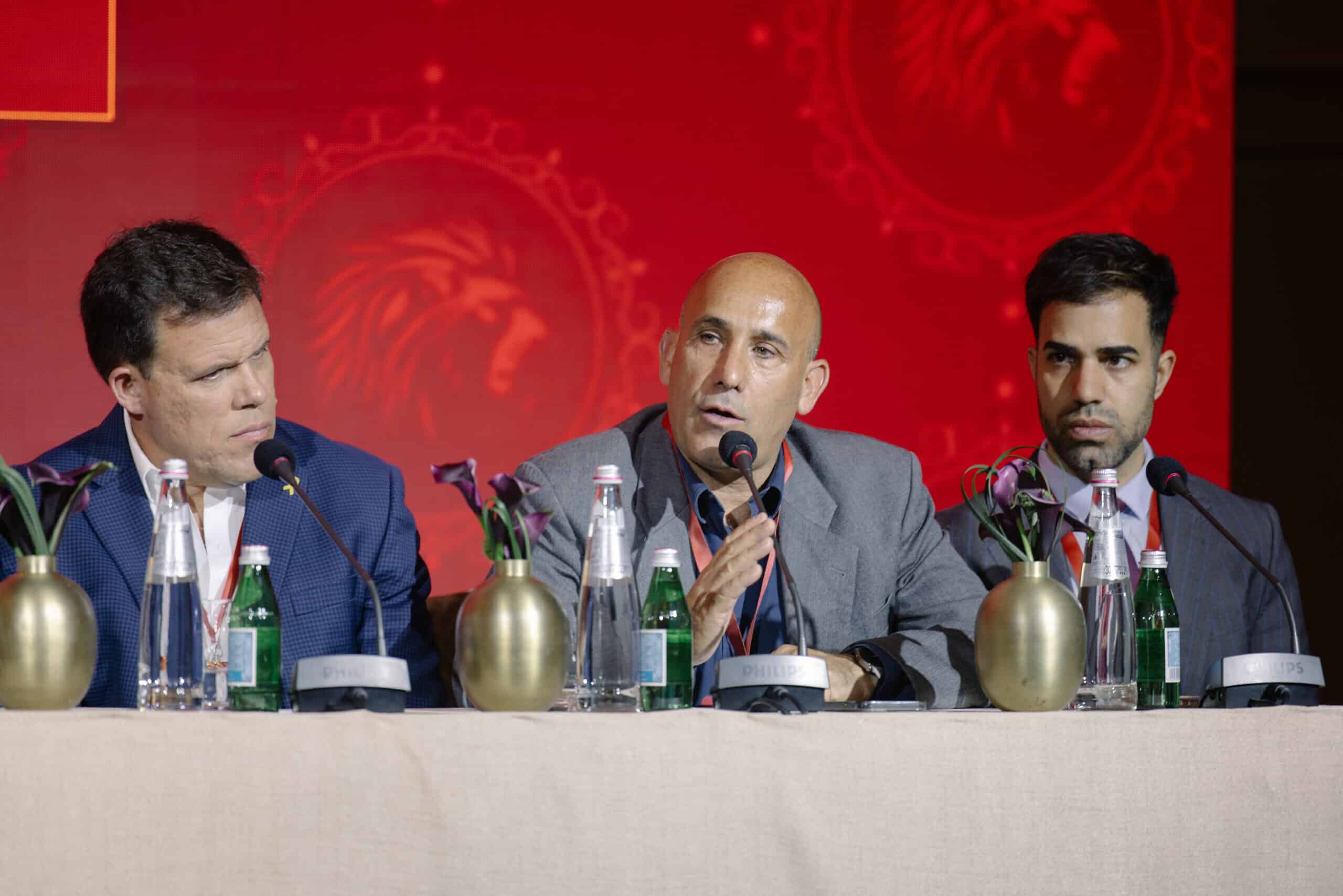by Canaan Lidor
Experts warned of persistent threats alongside major regional and energy opportunities for the Jewish state.
 |
Sarit Zehavi, fifth from left, speaks at the JNS
International Policy Summit in Jerusalem, Israel on April 25, 2025.
Photo by Shahar Yurman/JNS. |
Israel faces tremendous and unique opportunities as well as lingering threats following its military achievements against the Iranian axis since Oct. 7, 2023, Israeli and international security experts said Sunday at the JNS International Policy Summit in Jerusalem.
“The greater the military achievements are made now, the greater the prosperity and the alliance of peace that will follow the fighting,” IDF Brig. Gen. (res.) Amir Avivi, founder of the Israel Defense and Security Forum, told the audience of about 150 people at one of the packed conference rooms at the Jewish News Syndicate’s inaugural Policy Summit at the Waldorff Astoria hotel in Jerusalem.
This is because Israel “shares common interests with moderate Sunni countries, particularly security interests against Iran and radical Shi’ite forces, and against the Turkish-Qatari fundamental Sunni axis,” Avivi said.
Israel, he continued, “is positioned to win decisively across all fronts, with detailed plans already prepared to eliminate Hamas—the only unknown is the timing.”
Avivi was one of 11 high-profile speakers at a panel discussion on Regional Security at the conference, which featured top-level discussions on Israel’s future role on the global stage, the U.S.-Israel relationship, combating antisemitism, and extending sovereignty in Judea and Samaria. Others on the panel included Col. (res.) Richard Kemp, a former British Army commander who has defended Israel internationally; Yaakov Lappin, JNS’s military correspondent; and Dan Diker, president of the Jerusalem Center for Security and Foreign Affairs (JCFA).
Avivi noted a shift in Israel’s national focus “toward readiness for a possible Israeli-American military action against Iran, especially regarding its nuclear program.” He suggested that such military and strategic cooperation could pave the way for a broader regional and even global peace alliance, potentially attracting countries such as Lebanon, Iraq and others reconsidering previous alignments with Russia and China.

And there are also financial and trade incentives for a regional alliance, which will build on the Abraham Accords of 2020 and bring Saudi Arabia into that partnership, Avivi said.
“New pipelines connecting Saudi Arabia and the UAE to Eilat could enable the transfer of vast amounts of oil without passing through the vulnerable Bab el-Mandeb Strait or the Persian Gulf. This would not only make Israel a crucial player in global energy logistics but could also turn it into a commercial hub, the Singapore of the world,” he said. It would also mean an “endless supply” of fuel for Israel.
But, Avivi added, this could isolate Egypt and lead to “an issue there that needs to be resolved.”
Egyptian violations
Lt. Col. (res.) Jonathan Conricus, a media commentator and former international spokesperson for the Israel Defense Forces from 2017 to 2021, focused on Egypt, criticizing the Israeli government’s failure to confront Cairo over violations of its peace agreement with Israel.
“If we are honest amongst ourselves, we must admit that what we face is not just an inconvenience—it is a threat to our national security,” said Conricus. Virtually all of the weapons that Hamas used on Oct. 7, 2023, to murder 1,200 people in Israel and abduct another 251 came to the Gaza Strip through Egypt, he added.

“All of the commanders of the [IDF] Southern Command, ministers of defense and prime ministers knew about the tunnels [between Sinai and the Strip],” said Conricus, who personally participated in the destruction of such a tunnel as early as 2004, while serving in the IDF.
The Oct. 7, 2023 Hamas invasion, and the
initiation of hostilities against Israel by Hezbollah the following day,
prompted a massive Israeli military response that also involved Iran,
Syria and Yemen.
Despite changes across the Middle East, Israel has not adequately updated its strategy toward Egypt, Conricus said.
“Our strategy towards Egypt is perhaps the area where the State of Israel has failed to recognize the changing environment and failed to use the tools available,” he added.
Although Israel has begun showing “more teeth and power” against threats such as Hezbollah and Turkey’s influence, “it must urgently rethink its approach to Egypt,” treating it not as a minor diplomatic issue but as a core national security challenge, Conricus said.
Iran and Hezbollah
IDF Lt. Col. (res.) Sarit Zehavi, founder of the Alma Research and Education Center, highlighted Israel’s remarkable military achievements just months into the war against Hezbollah. Israel destroyed much of the terrorist group’s weapons, killed its entire top echelon and forced Hezbollah into a ceasefire whose terms call for its retreat from Southern Lebanon. It is not firing at Israel as it enforces the terms of this ceasefire, she added.
But, she said, Iran has made a “deliberate choice to continue supporting Hezbollah, even though it could have decided otherwise.”

Zehavi stressed that Israel’s current operations in Lebanon aim to prevent Hezbollah from rebuilding, but the situation on the ground remains tense, with the sounds of war still audible even kilometers away.
She warned against being deceived by diplomatic appearances such as new governments in Syria or Lebanon, and urged Israel to maintain maximum pressure not only on Iran but also on Lebanon and Syria. Zehavi emphasized the critical importance of community defense and ensuring that no financial or military resources reach radical Shi’ite groups.
Re-legitimize Israel
Kemp stressed the importance of public diplomacy in the context of the Swords of Iron war, calling for a global campaign to re-legitimize Israel in the face of decades-long efforts to delegitimize the Jewish state.
The British Army veteran prefaced his words with a sarcastic, sharply worded indictment of Israel, mimicking its haters, to convey to his mostly pro-Israel listeners the intensity with which the country is detested and maligned in some circles.

“False narratives portraying Israel as an illegal occupier have serious security and political consequences, influencing governments,” and fueling actions such as Britain’s recent partial arms embargo, Kemp warned.
Israel must assert its full legal rights to the land, including Gaza, Judea and Samaria, Kemp argued. Pro-Israel organizations worldwide must adopt and promote this legal reality, he said.
Overthrow the status quo
Lappin explored the shift in Israel’s defensive strategy following Oct. 7, when its policy of deterrence failed, requiring it to launch large-scale military operations that overturned the status quo instead of smaller ones designed to preserve it.
“The main lesson that Israel has learned from this catastrophe is that we can never again gamble its national security and the security of millions of its citizens on the idea that we can deter our enemies,” Lappin said.
This is evidenced in how Israel preemptively destroyed much of Syria’s military capabilities following the fall of Bashar Assad’s regime in December, and seized elevated positions on the Syrian side of the Golan, he said.
The underlying principle across all arenas must be “preventative action based on real-time intelligence,” a strategy Lappin said Israel must “continue for generations” to safeguard its security.
Canaan Lidor
Source: https://www.jns.org/israeli-victory-opens-path-to-peace-expert-tells-jns-summit/
No comments:
Post a Comment